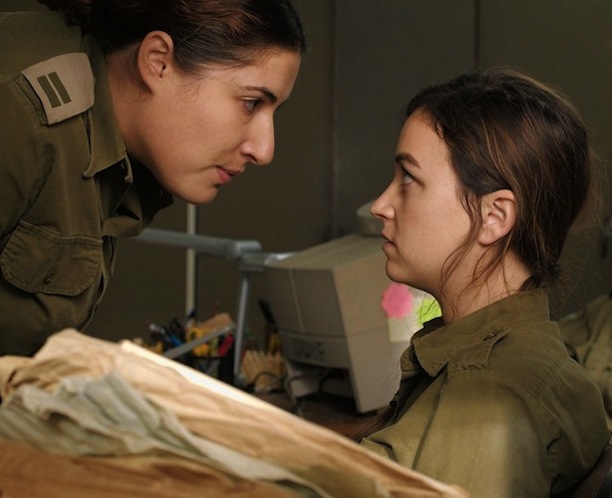Film Review: “Zero Motivation” — An Enthralling Hebraic Version of “M*A*S*H”
Are men totally useless in Zero Motivation? Well, they can come in handy when you want to use one of them as a sexual object.

Shani Klein as Rama, left, and Nelly Tagar as Daffi in “Zero Motivation.” Photo: Zeitgeist Films.
Zero Motivation, written and directed by Tayla Lavie. At Kendall Square Cinema, Cambridge, MA.
By Gerald Peary
When Israeli filmmaker Tayla Lavie was here in November for the Boston Jewish Film Festival, I asked her if my analogy was correct: that her enthralling first feature, Zero Motivation, was a Hebraic version of M*A*S*H. She readily agreed. Altman’s anarchic war comedy is one of her favorite films, and she actually tried to get her release company to do the Zero Motivation poster as a mock-up of the original poster for M*A*S*H.
OK, then, Zero Motivation is an Israeli retort to M*A*S*H. Its cast of slackers and underachievers drafted into the Israeli army are as indifferent to their country’s wars as are M*A*S*H’s nihilists, who barely notice they’re fighting in Korea. In both films, the “cool” characters, though in uniform, would far rather play infantile games than battle an enemy; and the straightlaced officers who believe in the military are figures of ridicule.
But the comparisons stop here. Vive la différence! Trapper and Hawkeye, the brash, sexist, rakish heroes of Robert Altman have been supplanted by Daffi (Nell Tagar) and Zohar (Dana Ivgy), willful female protagonists. Here’s a movie set in the army which, at every moment, is about women serving in the army. Lavie has no interest in her army men except to satirize them and criticize them. One soldier cheats on his girlfriend, another is a macho rapist, another tells anti-gay jokes. The officers we meet are a condescending, macho lot who insist that women soldiers serve them coffee, a chance for them to gawk at the women’s butts. Are men totally useless in Zero Motivation? Well, they can come in handy when you want to use one of them as a sexual object. That’s about it for Israel’s proud male military machine.
Zero Motivation is set in the women’s bunker on a tiny army base in the deep south of Israel, on an arid desert far from any city. The buildings look like a welfare motel, and the women live in extremely close quarters, on shaky bunk beds in dormitory-sized rooms. It’s all stifling and pretty boring, as everyone waits out the required two years of military service. Only one woman, Rama (Shani Klein), is an officer. The others pass their days in menial, non-combative office jobs. Daffi and Zohar lie about, indulge in video games, and plot to sneak around their high-level military duties: to empty trash cans and shred the paper products they find therein.
Zohar gets by, mostly because she is so happy in her tight friendship with Daffi. But Daffi sniffles and cries night and day, piling up soiled tissues, as she craves to escape. She yearns to be stationed in idyllic Tel Aviv. She dreams of walking on wide streets paved with palm trees and shaded by modernist, towering skyscrapers. Obsessively, Daffi types out letters to the Israeli high command begging to be transferred. Zohar’s obsession? To get laid. She sees herself as the only virgin who grew up on a kibbutz, the only virgin among the army women, the only virgin on the whole army base.
There are several interesting side plots, one involving a suicidal young woman whose boyfriend has cruelly moved on, another a Russian volunteer haunted by a bloody ghost, another the vain attempts of the only female officer to either rise up in rank or get the respect of the unmotivated women under her command. But most of Zero Motivation deals with the unraveling of Zohar and Daffi’s friendship, after each has betrayed the other. There is no forgiveness, just escalating rage and hostility, culminating in an almost lethal fight involving loaded staple guns.
Did I mention that both female protagonists are deeply self-absorbed, and also a little bit crazy? Director Lavie clearly adores her women characters but she certainly doesn’t sentimentalize them. And unlike in most military comedies, the protagonists never shape up and learn to be disciplined soldiers eager to fight for their country. As the title says: zero motivation. How treasonous they would seem to those late Israeli leaders, David Ben-Gurion and Ariel Sharon, whose hawkish visages look down from a wall behind a roomful of male officers.
Gerald Peary is a professor at Suffolk University, Boston, curator of the Boston University Cinematheque, and the general editor of the “Conversations with Filmmakers” series from the University Press of Mississippi. A critic for the late Boston Phoenix, he is the author of 9 books on cinema, writer-director of the documentary For the Love of Movies: the Story of American Film Criticism, and a featured actor in the 2013 independent narrative Computer Chess
